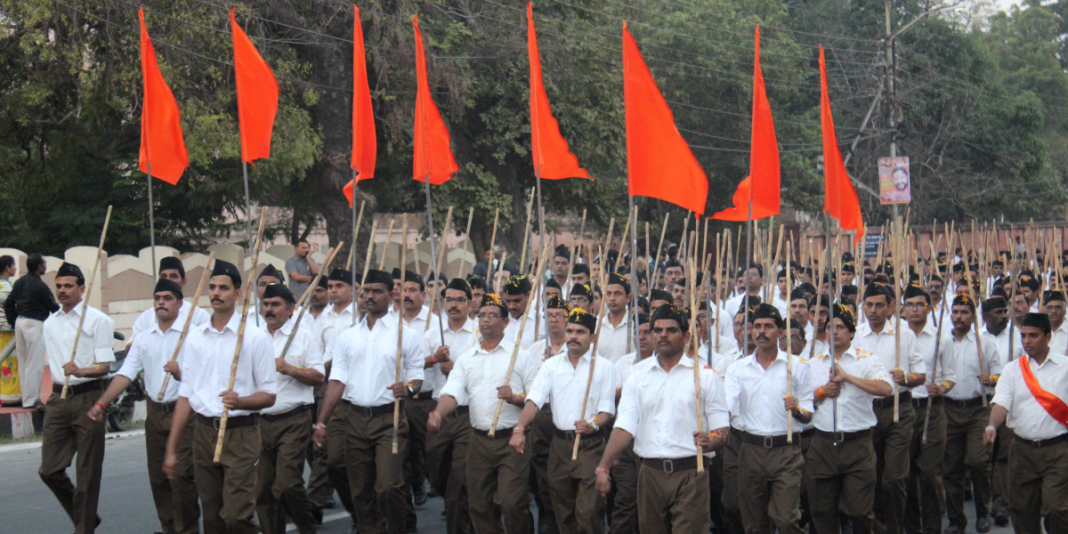DM Monitoring
NEW DELHI: Recently, the Government of India removed the six-decade-old ‘ban’ on government employees taking part in the activities of Rashtriya Swayamsevak Sangh (RSS) through a Department of Personnel & Training, ‘order’: “The undersigned is directed to refer to the OM (office memorandum)..dated 30.11.1966, OM No. 7/4/70-Est.(B) dated 25.07.1970 and OM No. 15014/3(S)/80- Estt. (B) dated 28.10.1980 on the above subject. 2.
The aforesaid instructions have been reviewed and it has been decided to remove the mention of Rashtriya Swayam Sewak Sangh (R.S.S.S) from the impugned OMs dated 30.11.1966, 25.07.1970 and 28.10.1980.”
One thought this was a sacrilege committed to the secular fabric of India and its constitution. Besides, it is a brazen violation of Section 5 (1) of The Central Civil Services (Conduct) Rules, 1964: “No Government servant shall be a member of, or be otherwise associated with, any political party or any organisation which takes part in politics nor shall he take part in, subscribe in aid of, or assist in any other manner, any political movement or activity.”
But the honourable judges of the Madhya Pradesh high court do not think so and they are upset because it took almost five decades for the Central government to realise its mistake, in acknowledging that an internationally renowned organisation like RSS was wrongly placed amongst the banned organisations of the country and that its removal therefrom is essential. The court felt that the aspirations of many Union government employees of serving the country in many ways got diminished in these five decades because of this ban.
The court also questioned as to why the ban had been imposed in the first place. “The question therefore arises is, on what study or basis, activities of RSS organisation as a whole were treated in the decades of 1960s and 70s as communal or antisecular; what was the empirical report, statistical survey or material, that led the then government of the day to arrive at an objective satisfaction that involvement of Central Government employees with the RSS,” the court asked. It also questioned the treatment of RSS’s subsidiary non-political organisations.
Such loaded rhetoric can be responded to only with a historical perspective. As soon as the British finally left in 1947, the subcontinent was partitioned into two independent nation-states: Hindu-majority India and Muslim-majority Pakistan. Immediately, there began one of the greatest migrations in human history. Across the Indian subcontinent, communities that had coexisted for almost a millennium attacked each other in a terrifying outbreak of sectarian violence.
Some 75,000 women were raped, and many of them were then disfigured or dismembered. Gangs of killers set whole villages aflame, hacking to death men and children and the aged while carrying off young women to be raped. Some British soldiers and journalists who had witnessed the Nazi death camps claimed Partition’s brutalities were equally bad: pregnant women had their breasts cut off and babies hacked out of their bellies; infants were found literally roasted on spits. By 1948, as the great migration drew to a close, more than 15 million people had been uprooted, and between one and two million were dead.
There is a reason why such horrors happened. H.B. Hedgewar, the founder of Rashtriya Swayamsevak Sangh (RSS), had openly declared that its aim was not to oppose the British and join the movement for independence but to oppose the yavana-snakes (Muslims), who are the real enemies.
His lieutenant M.S. Golwalkar, who since June 1940 had been the sarsanghachalak (supreme leader) of RSS, went further and wrote this in 1938: “The non-Hindu people in Hindustan must adopt the Hindu culture and language, must learn to respect and hold in reverence Hindu religion, must entertain no idea but those of the glorification of Hindu race and culture… They may stay in the country wholly subordinate to the Hindu nation, claim nothing, deserve no privileges far less any preferential treatment, not even citizen’s rights.”
It is the same Golwalkar who had also given this dastardly call: “Hindus, don’t waste your energy fighting the British; save your energy to fight our internal enemies that are Muslims, Christians and Communists.”
In his book (We or Our Nationhood Defined, 1938), Golwalkar also justified Hitler’s genocide of Jews expressing his mindset to do the same for India’s Muslims and other minority communities: “German race pride has become the topic of the day. To keep up the purity of the Race and its culture Germany shocked the world by purging the country of the semitic Races – the Jews. Race pride at its highest has been manifested here. Germany has shown how well neigh impossible it is for the Races and cultures having differences going to the roots, to be united into one united whole, a good lesson for use in Hindustan to learn and profit by.”
With their plans to make Muslims second-rate citizens in independent India, RSS and Hindu Mahasabha bear a major responsibility for partition and the horrors that ensued. What is more, in January 1948, there was a succession of meetings between a group of fanatical young men – two brothers, Nathuram Vinayak Godse and Gopal Godse, Narayan Dattatraya Apte, Madanlal Pahwa, Vishnu Karkare, Badge and Kistayya – at the Bombay headquarters of Hindu Mahasabha and at the home of Vinayak Damodar Savarkar, former president of the Mahasabha. Their plan was not only to assassinate Gandhi but Jawaharlal Nehru and Jayaprakash Narayan (JP) as well because to them Nehru was the political and JP the moral heir of the Mahatma and they wanted to finish off all the vestiges of the freedom movement.



